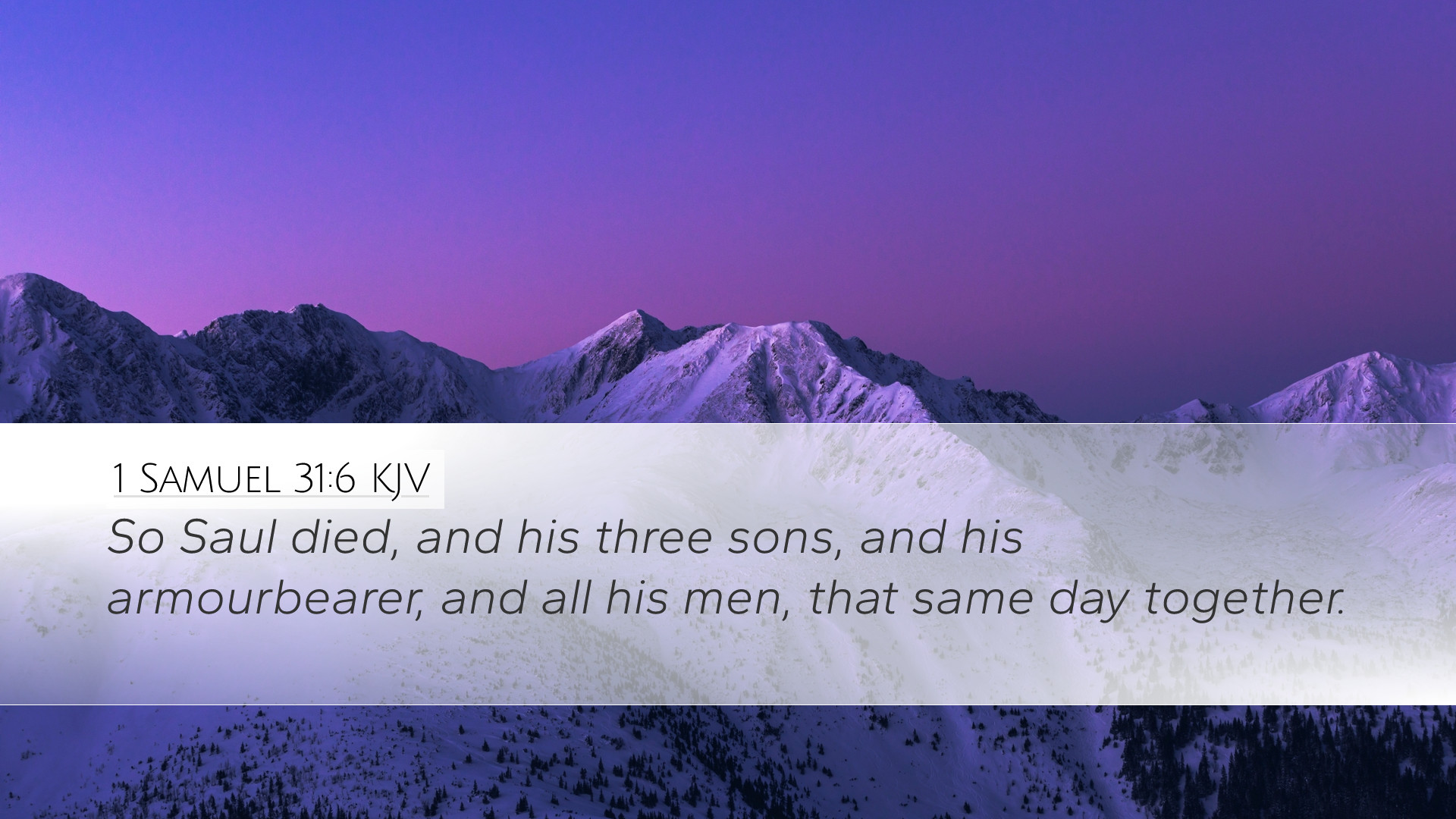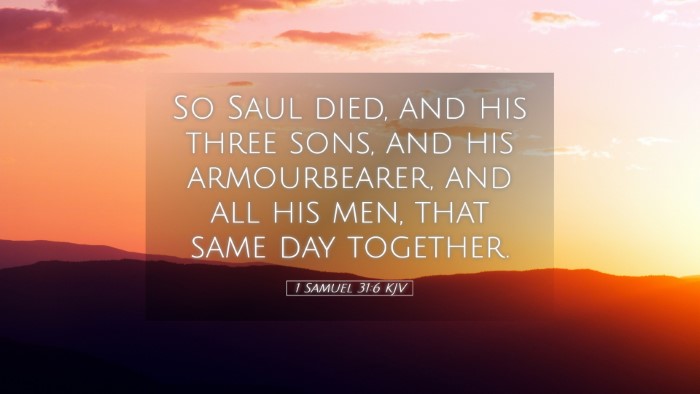Commentary on 1 Samuel 31:6
Verse: "So Saul died, and his three sons, and his armor-bearer, and all his men, that same day together." (1 Samuel 31:6)
Overview
The tragic conclusion of Saul's life is encapsulated in 1 Samuel 31:6. This verse symbolizes not only the end of Saul’s reign but also the culmination of Israel’s turmoil during his leadership. An analysis of this passage offers deep spiritual and theological insights into the themes of leadership, obedience, and divine judgment.
Insights from Matthew Henry
Matthew Henry highlights the somber reality of Saul's death as a divine judgment for his disobedience to God. His commentary emphasizes the philosophy that the consequences of sin are real and often tragic. The deaths of Saul’s sons alongside him serve as a reflection of the familial and communal impact of leadership failure. Each loss signifies the end of an era, signifying how a leader’s choices affect not only themselves but their lineage and people.
Key Themes of Leadership and Accountability
- Leadership Responsibility: Henry posits that with leadership comes profound responsibility. Saul's demise illustrates that leaders are accountable for their actions, which directly influence their followers.
- Tragedy of Disobedience: The commentary illuminates the harsh realities of disobedience to divine commands. Saul's failure to heed the prophetic warnings resulted in catastrophic outcomes.
Insights from Albert Barnes
Albert Barnes comments on the tragic circumstances surrounding Saul's death. He notes how the narrative illustrates the fulfillment of God’s judgment as previously declared through Samuel. Barnes accentuates the dramatic consequence of Israel's unfaithfulness and Saul's inability to trust in God during critical moments.
Divine Justice and Human Agency
- Judgment Executed: Barnes asserts that Saul's death, alongside that of his family, was a prophetic fulfillment and a vital lesson in God's justice.
- Human Agency: Barnes also points out the role of human choice in the divine narrative. Saul’s decisions led to his downfall, signifying the intersection of divine sovereignty and human responsibility.
Insights from Adam Clarke
Adam Clarke provides a thorough analysis of Saul's demise, paying particular attention to the psychological and spiritual dimensions of his final hours. Clarke emphasizes the despair and hopelessness Saul experienced, particularly when faced with overwhelming defeat. He also reflects on the moral implications of such a fate for Israel's leadership.
The Human Condition and Despair
- Soul’s Despair: Clarke interprets Saul's actions leading to his death as a culmination of despair, highlighting how his lack of faith and disobedience resulted in ultimate hopelessness.
- Implications for Future Leadership: Clarke argues that Saul’s end serves as a cautionary tale for future leaders about the dire consequences of turning away from divine guidance.
Theological Reflections
This verse serves as a sobering reminder of the fatal consequences of a life lived in rebellion against the divine will. Each commentator adds unique perspectives, emphasizing the interconnectedness of faith, leadership, and morality. The deaths of Saul and his sons symbolize the complete collapse of a once-promising leadership, leading to a profound leadership vacuum in Israel.
Lessons for Modern Leadership
- Faithfulness to God: The commentary from these scholars highlights the centrality of being faithful to God's commands as a prerequisite for effective leadership.
- The Weight of Leadership: Modern leaders must recognize the heavy burden of leadership that impacts not just themselves but their communities.
- Hope amidst Failure: Despite Saul's tragic end, there remains an underlying current of hope for redemption and restoration in God’s plan, showcasing that even through failure, God's sovereignty continues to prevail.
Conclusion
1 Samuel 31:6 serves as a vital passage for understanding the complexities of divine judgment, human failure, and the weight of leadership. The insights provided by Matthew Henry, Albert Barnes, and Adam Clarke together weave a timeless narrative that challenges readers to reflect on their own lives and leadership styles. Ultimately, the significance of this verse lies in its ability to provoke introspection and urge integrity in following God’s will.


